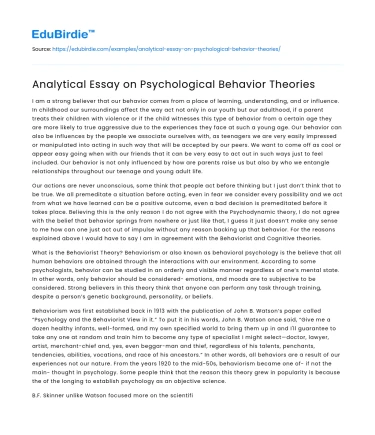I am a strong believer that our behavior comes from a place of learning, understanding, and or influence. In childhood our surroundings affect the way act not only in our youth but our adulthood, if a parent treats their children with violence or if the child witnesses this type of behavior from a certain age they are more likely to true aggressive due to the experiences they face at such a young age. Our behavior can also be influences by the people we associate ourselves with, as teenagers we are very easily impressed or manipulated into acting in such way that will be accepted by our peers. We want to come off as cool or appear easy going when with our friends that it can be very easy to act out in such ways just to feel included. Our behavior is not only influenced by how are parents raise us but also by who we entangle relationships throughout our teenage and young adult life.
Our actions are never unconscious, some think that people act before thinking but I just don’t think that to be true. We all premeditate a situation before acting, even in fear we consider every possibility and we act from what we have learned can be a positive outcome, even a bad decision is premeditated before it takes place. Believing this is the only reason I do not agree with the Psychodynamic theory, I do not agree with the belief that behavior springs from nowhere or just like that, I guess it just doesn’t make any sense to me how can one just act out of impulse without any reason backing up that behavior. For the reasons explained above I would have to say I am in agreement with the Behaviorist and Cognitive theories.
Save your time!
We can take care of your essay
- Proper editing and formatting
- Free revision, title page, and bibliography
- Flexible prices and money-back guarantee
What is the Behaviorist Theory? Behaviorism or also known as behavioral psychology is the believe that all human behaviors are obtained through the interactions with our environment. According to some psychologists, behavior can be studied in an orderly and visible manner regardless of one’s mental state. In other words, only behavior should be considered- emotions, and moods are to subjective to be considered. Strong believers in this theory think that anyone can perform any task through training, despite a person’s genetic background, personality, or beliefs.
Behaviorism was first established back in 1913 with the publication of John B. Watson’s paper called “Psychology and the Behaviorist View in it.” To put it in his words, John B. Watson once said, “Give me a dozen healthy infants, well-formed, and my own specified world to bring them up in and I'll guarantee to take any one at random and train him to become any type of specialist I might select—doctor, lawyer, artist, merchant-chief and, yes, even beggar-man and thief, regardless of his talents, penchants, tendencies, abilities, vocations, and race of his ancestors.” In other words, all behaviors are a result of our experiences not our nature. From the years 1920 to the mid-50s, behaviorism became one of- if not the main- thought in psychology. Some people think that the reason this theory grew in popularity is because the of the longing to establish psychology as an objective science.
B.F. Skinner unlike Watson focused more on the scientific explanation rather than the methods, Skinner believed in Radical Behaviorism which is the belief that observable behavior was more of a manifestation of indistinguishable mental processes. His take on behaviorism was to understand the association between an animal’s behavior and its environment.
Behaviorist psychologist have confidence that humans’ behaviors come from conditioning, which links a stimulus to the environment- like a sound, or smell, and how the human responds to that sound or smell. Studies in behaviorism demonstrated differences between two types of conditioning: Classical and Operant. Classical conditioning is the process in which a human or animal learn to associate two unrelated stimuli with one another. A good example of this is the “Little Albert” study conducted by psychologist J.B. Watson in which he trained a little boy to be afraid of a white rat through the act of sound, every time the boy was presented with the rat Watson created a loud noise to scare off the child until he no longer wanted to be near the animal from the fear of the sound that came every time he got near it.
Operant conditioning is the act in which an animal or human learn behavior through consequences. There are three types of reinforcement to this conditioning: Positive, Negative, and Punishment. An example of an experiment on operant conditioning is one by psychologist B.F. Skinner named “Skinner Boxes”. Skinner places a rat inside a box next to a lever that when it was pressed it would deliver food for the animal, once the rat realized this he began to run straight trough the lever in order to obtain the reward it came with stepping on it, after a while Skinner then placed the rat in a box with an electrified floor, when the rat stepped on the lever it would be shocked in response, and once again when it realized the outcome he strayed from the lever all completely.
As time went on Behaviorism lost power to cognitive psychology in the mid-20th century, which compares the mind to a an information processing system.






 Stuck on your essay?
Stuck on your essay?

